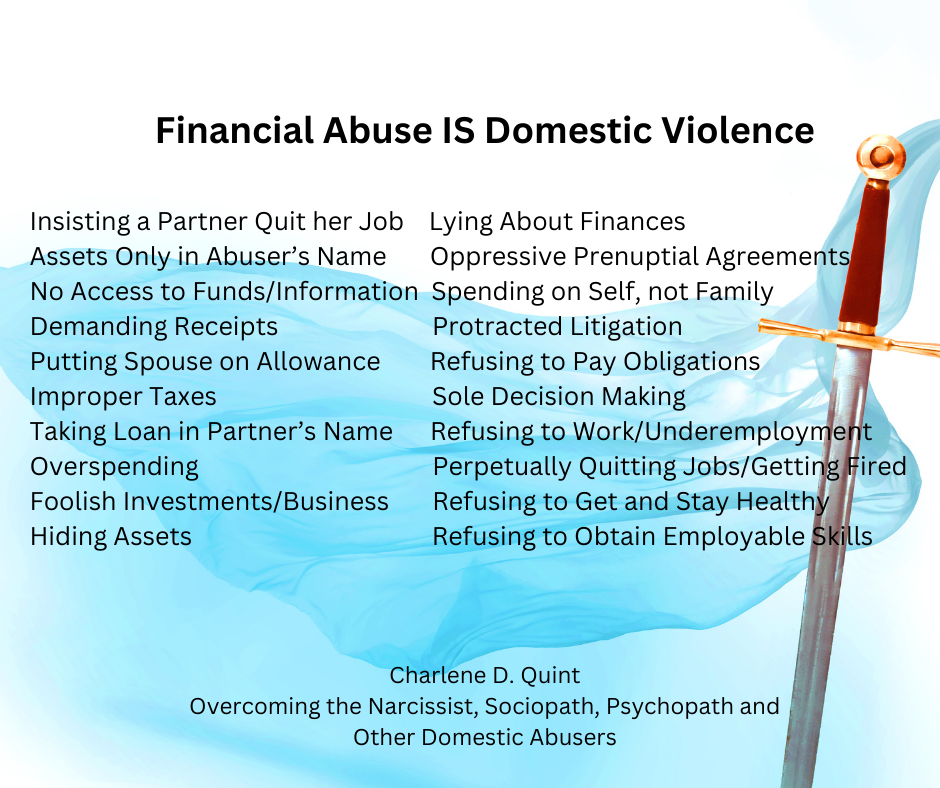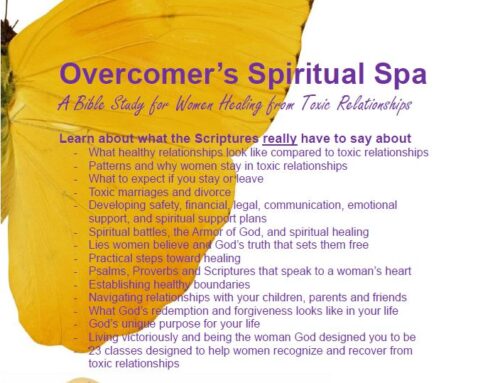Financial Abuse IS Domestic Violence: The 20 Most Common Tactics of Financial Abuse
Today I just spoke to yet another woman who had been in denial that she was in an abusive marriage because she was not always being hit, but her husband refused to work and support their family.
Here’s the truth: Financial abuse IS domestic violence.
According to research, financial abuse occurs in 99% of abusive relationships. Many people do not recognize financial abuse, because it is rarely talked about. We know hitting and choking is abuse, but who has even heard about financial abuse?
Domestic violence is about power and control. Money is power. Abusers know that. We need to know it too.
So, what does financial abuse look like? How does a toxic person use money to gain control over his partner? There are many ways. Most abusers fall into one of two camps. There are those abusers who are wealthier than their spouse and do not allow a spouse access to assets. They believe that all the assets acquired during a marriage are all theirs, and give the lesser earning spouse no credit for their efforts towards raising a family or helping the higher earning spouse further their career or education.
On the other hand, there are those who refuse to earn what they are capable of earning and live like parasites off a hard-working spouse. They believe they are entitled to do nothing and still want half of the assets plus maintenance in a divorce.
Below are the 20 most common tactics of financial abuse.
- Insisting a partner quit her job or her education. Let’s start with something that may seem quite innocent. Abusers with money will often insist, coerce, or demand that their partner quit a job, a career or education. They may claim to their partner that this is beneficial to her because she can stay home, raise the children, redecorate the house, travel with him, or other perks. But don’t be fooled. When an abuser asks you to quit your job or education, it’s because he wants you to be completely dependent upon him financially. And that is often his first step in his strategic plan to gain power and control. An abuser knows that a partner without any income is much less likely to leave.
- Putting the Assets in the Abuser’s Sole Name. Once a couple gets married, it is often the sign of a healthy marriage to title assets like the home, cars, bank accounts, investments, and other marital assets in the names of both parties, so both parties have access to assets. However, an abuser will often insist that the assets are in his name alone. He may give a number of excuses, but the bottom line is, he won’t put your name on the asset because he wants you to have no access.
- No Access to Funds. A common tactic is to not allow a spouse to have access to funds in a checking account. If a spouse needs money, she is forced to go to him and ask or beg. An abuser knows that if his partner has no access to funds, she will not be able to hire an attorney or support herself during a lengthy divorce lawsuit. Healthy marriages are built on trust with both spouses having access to needed funds.
- Demanding Receipts. Abusers will often be so controlling that they demand receipts and change when their spouse spends money. That way, they will know and control where every penny is being spent. This is belittling, degrading, and treating her like a child.
- Putting a Spouse on an Allowance. Similar to demanding receipts, is putting a spouse on an “allowance.” Allowances are for children, not for responsible adults.
- Improper Taxes. Paying taxes is an area that causes a lot of trouble. Some abusers refuse to file taxes or file them late, putting themselves and their spouse at risk of fines and penalties. It is common for abusers to under report income, or put personal expenses through a business they own to lower reported income. And others forge the signature of their spouse, putting her at risk of liability to something she doesn’t even know about.
- Taking out Loans in Spouse’s Name. Because abusers often have the personal information of a partner, they will often take out loans, credit cards, and other accounts in the name of their spouse without her knowledge or approval.
- Overspending. Abusers love to spend money on themselves to impress others. Fancy boats, cars, planes, jewelry, clothes, houses, vacations. You name it. Rather than spending within their means, they often spend far above their means, squander their assets, and cause financial disaster for themselves and their family.
- Foolish Business Deals. Abusers usually think very highly of themselves. They believe they are so wonderful and so smart, that whatever they do, they cannot fail. They truly think they have the “golden touch.” And so they invest in high risk business ventures, thinking they will make it rich quick. They may keep pouring money into losing ventures to keep them from failing, but eventually, they fail.
- Hiding Assets. Abusers with money are notorious for hiding assets. They will purchase real estate using unnamed land trusts to avoid a spouse discovering a second home. They keep money in off shore accounts. They put all their assets in a trust. They refuse to inform a spouse about assets, even if she is entitled to half.
- Lying About Finances. Lying and deception are essential characteristics of abusers. They will lie about everything, including finances. If they are trying to impress someone, such as when they are trying to get a bank loan or hang with the rich crowd, they will brag and inflate their assets and income. But if they have to pay maintenance or child support, they will claim poverty.
- Prenuptial Agreements. Wealthy abusers who have significant assets and income usually try to coerce a partner into a prenuptial agreement just prior to a marriage. The exception to this may be if they already have their assets and income tied up in an impenetrable trust. The prenuptial agreements are almost always one-sided and oppressive. The prenups are often foisted upon the partner under duress and in coercive situations, such as after the abuser has convinced his unsuspecting partner to quit a job and after the wedding invitations are already out.
- Spending on Themselves, but Not on a Spouse and Children. Abusers are in love with themselves, but not necessarily others in their family. They often have no problem spending money on themselves. They shop at top end stores and buy designer products, while their spouse and children end up shopping at thrift stores and passing up needed health care.
- Protracted Litigation. Toxic people use litigation as a financial weapon. They refuse to be reasonable, they refuse to follow court orders, and they drag out litigation to wear down a partner and financially drain her. Even after a divorce is finalized and court orders are entered, they often refuse to pay court-ordered maintenance and child support, thereby dragging a former spouse into court for years.
- Refusing to Pay or Fulfill Obligations. People who choose to be toxic are notorious for not paying their obligations, especially if it hurts a spouse or former spouse. They often do not pay maintenance and child support. If it hurts a former partner, they will refuse to pay a mortgage and let property go into foreclosure. They rack up credit card debt, and take out loans they never intend to repay. If they are required to do something under a contract, they typically refuse to comply, especially if they have already been paid.
- Sole Decision Making. Abuse is essentially about power and control. Abusers want to be the sole decision maker when it comes to finances, as well as nearly every other aspect of life. They don’t take into account that a marriage is an equal partnership, regardless of the incomes or assets of each party. Their “Golden Rule” is “The one with the gold makes the rules.”
- Refusing to Work/Underemployment. While many abusers are financially successful, on the other side of the coin are abusers who are financial failures due to their own lack of work ethic. They refuse to work and insist that their spouse support them. They always have a number of excuses, but they just refuse to get up and get a damn job. Real men support their families. No excuses.
- Perpetually Quitting Jobs or Getting Fired. Abusers don’t want to be bothered with hard work or work they think is beneath them, and they have a hard time with authority. Many are perpetual quitters. They have 100 excuses why a job isn’t for them. If they don’t quit jobs, abusers often get fired. A lot. They create toxic environments, start conflict and division, neglect their duties, and have a whole host of other unhealthy behaviors that get them fired. Then they blame everyone but themselves.
- Refusing to Get and Stay Healthy. Many people who are toxic to others are also toxic to themselves. They may be addicted to alcohol, drugs, sex, food, video games, or the internet. They may refuse to get the proper nutrition, sleep, exercise, or medical care. All of this takes a toll on their minds and bodies. They will then use poor health or addictions as an excuse to keep them from working.
- Refusing to Obtain Skills Required for a Job. Many toxic people are smart, but lazy. They simply are unwilling to obtain the education or training or skills that will enable them to get a well-paying job. Therefore, they remain in low paying jobs and never reach their full potential.
Financial abuse IS domestic violence. Like other types of abuse, financial abuse is designed to obtain and maintain power and control over a partner. However, financial abuse is often not even recognized as abusive.
In healthy marriages, spouses treat each other as equal partners – with equal decision making – with access to resources. Healthy partners share power concerning financial decisions.
If you find yourself in financial abuse, please seek out help from your local domestic violence organization. You are not alone.
You can live a life of peace and joy, but you cannot do that while living with a toxic person.
With love and truth, Charlene


